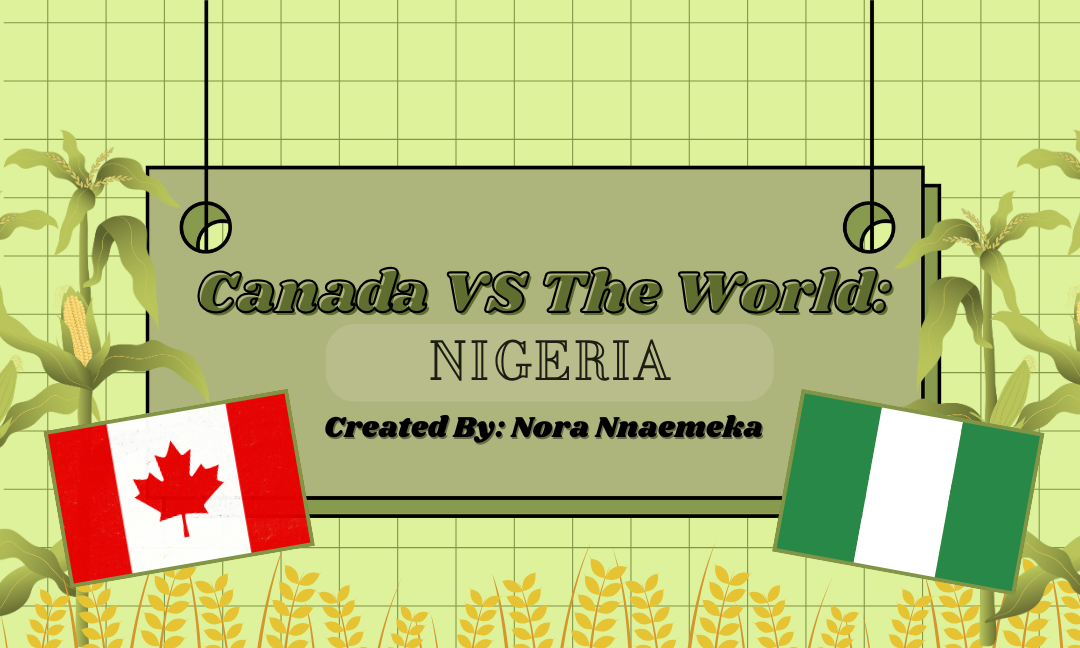Written by: Nora Nnaemeka
Edited by: Mannat Malhan
Designed by: Rashiqa Ali
Have you ever stopped to think about where your food actually comes from? Whether it’s the cereal you eat for breakfast or the fruit in your smoothie, every bite and sip has a story. Around the world, food farming and food processing look completely different; two great examples of those differences are Canada and Africa.
Canada’s Modern Tech and the Advantage
Farming in Canada is all about technology, organization, and efficiency. Huge machines glide across golden fields, guided by GPS and computers. This super-efficient way of farming is beneficial because of the time and money it saves.
Nigeria’s Methods
The majority of African farmers work tiny areas of land, mainly to provide food for their families. Crop growth is strongly dependent on rainfall, as just 6% of fertile land in Sub-Saharan Africa is irrigated, leaving farmers vulnerable to droughts.
Frequent farming makes minimal use of external inputs, resulting in diminishing soil fertility, which is compounded by practices such as shortened fallow times. Traditional practices like shifting cultivation, intercropping, and mixed crop-livestock systems are frequently used, demonstrating ecological adaptation to local conditions despite their labour-intensive nature.
What The Two Can Learn From Each Other
Canada could learn from Africa’s community-driven, low-waste farming — where every bit of land and water is valued. Africa can learn from Canada’s modern use of technology and tool organization to boost productivity and reduce food waste.
Even though they’re worlds apart, both countries share one big goal: to feed people in a way that we’ll still have plenty of food for generations to come.
Conclusion
Next time you open a bag of chips or sit down for a tasty dinner, think about the journey your food has taken across both fields and continents. Behind every meal is a farmer, no matter where in the world, who is doing their best to grow food for all of us.
Let’s thank them by reducing food waste and making sure their hard work is valued by composting so that our waste can become a tool instead of a disadvantage.
#ReduceTheWaste #YFSFoodGoals #FoodTravels2
Bibliography
Works Cited
Foundation for Sustainable Smallholder Solutions. “Transforming Nigerian Agriculture Through Sustainable Farming.” FSS Solutions, 2024, fsssolutions.org/sustainable-farming/transforming-nigerian-agriculture-through-sustainable-farming/
UNDP Nigeria. “Farmers in Nigeria Improve Productivity through Sustainable Farming Methods.” UNDP Nigeria Stories, 21 July 2022, www.stories-undpnigeria.org/farmers-in-nigeria-improve-productivity-through-sustainable-farming-method
Hein, Treena. “Agriculture in Canada”. The Canadian Encyclopedia, 21 December 2023, Historica Canada. thecanadianencyclopedia.ca/en/article/agriculture-in-canada.
Real Farm Lives. “Real Farming 101: Sustainable Agriculture.” Real Farm Lives, realfarmlives.ca/real-farming-101-sustainable-agriculture/. (realfarmlives.ca)

